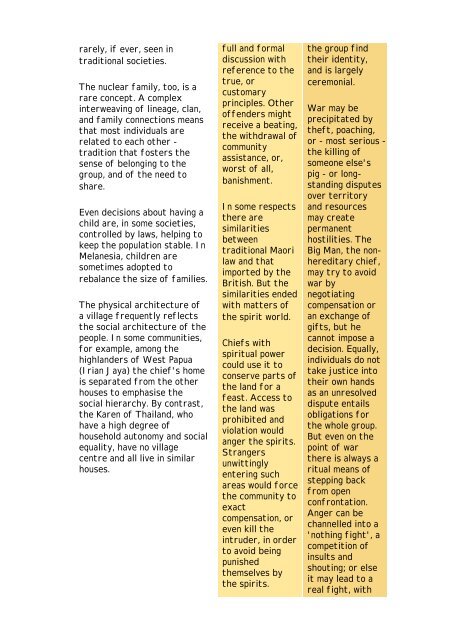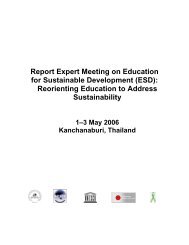Module 11 | Indigenous knowledge and sustainability - APCEIU
Module 11 | Indigenous knowledge and sustainability - APCEIU
Module 11 | Indigenous knowledge and sustainability - APCEIU
You also want an ePaper? Increase the reach of your titles
YUMPU automatically turns print PDFs into web optimized ePapers that Google loves.
arely, if ever, seen in<br />
traditional societies.<br />
The nuclear family, too, is a<br />
rare concept. A complex<br />
interweaving of lineage, clan,<br />
<strong>and</strong> family connections means<br />
that most individuals are<br />
related to each other -<br />
tradition that fosters the<br />
sense of belonging to the<br />
group, <strong>and</strong> of the need to<br />
share.<br />
Even decisions about having a<br />
child are, in some societies,<br />
controlled by laws, helping to<br />
keep the population stable. In<br />
Melanesia, children are<br />
sometimes adopted to<br />
rebalance the size of families.<br />
The physical architecture of<br />
a village frequently reflects<br />
the social architecture of the<br />
people. In some communities,<br />
for example, among the<br />
highl<strong>and</strong>ers of West Papua<br />
(Irian Jaya) the chief's home<br />
is separated from the other<br />
houses to emphasise the<br />
social hierarchy. By contrast,<br />
the Karen of Thail<strong>and</strong>, who<br />
have a high degree of<br />
household autonomy <strong>and</strong> social<br />
equality, have no village<br />
centre <strong>and</strong> all live in similar<br />
houses.<br />
full <strong>and</strong> formal<br />
discussion with<br />
reference to the<br />
true, or<br />
customary<br />
principles. Other<br />
offenders might<br />
receive a beating,<br />
the withdrawal of<br />
community<br />
assistance, or,<br />
worst of all,<br />
banishment.<br />
In some respects<br />
there are<br />
similarities<br />
between<br />
traditional Maori<br />
law <strong>and</strong> that<br />
imported by the<br />
British. But the<br />
similarities ended<br />
with matters of<br />
the spirit world.<br />
Chiefs with<br />
spiritual power<br />
could use it to<br />
conserve parts of<br />
the l<strong>and</strong> for a<br />
feast. Access to<br />
the l<strong>and</strong> was<br />
prohibited <strong>and</strong><br />
violation would<br />
anger the spirits.<br />
Strangers<br />
unwittingly<br />
entering such<br />
areas would force<br />
the community to<br />
exact<br />
compensation, or<br />
even kill the<br />
intruder, in order<br />
to avoid being<br />
punished<br />
themselves by<br />
the spirits.<br />
the group find<br />
their identity,<br />
<strong>and</strong> is largely<br />
ceremonial.<br />
War may be<br />
precipitated by<br />
theft, poaching,<br />
or - most serious -<br />
the killing of<br />
someone else's<br />
pig - or longst<strong>and</strong>ing<br />
disputes<br />
over territory<br />
<strong>and</strong> resources<br />
may create<br />
permanent<br />
hostilities. The<br />
Big Man, the nonhereditary<br />
chief,<br />
may try to avoid<br />
war by<br />
negotiating<br />
compensation or<br />
an exchange of<br />
gifts, but he<br />
cannot impose a<br />
decision. Equally,<br />
individuals do not<br />
take justice into<br />
their own h<strong>and</strong>s<br />
as an unresolved<br />
dispute entails<br />
obligations for<br />
the whole group.<br />
But even on the<br />
point of war<br />
there is always a<br />
ritual means of<br />
stepping back<br />
from open<br />
confrontation.<br />
Anger can be<br />
channelled into a<br />
'nothing fight', a<br />
competition of<br />
insults <strong>and</strong><br />
shouting; or else<br />
it may lead to a<br />
real fight, with








